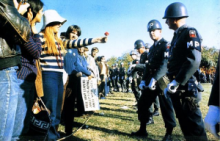Article
The hippie movement emerged from the tumultuous 1960s in North America and Western Europe. Hippies were often teenagers, college students, or young adults that were either of the baby boomer generation or that generations' subsequent offspring. Hippies possessed a core set of beliefs that revolved around the values of peace, love, and respect for nature as being essential in an increasingly globalized, technological, and violent society. Hippies were often associated with non-violent demonstrations and were especially visible in the U.S. during the Vietnam War era, when they organized countless anti-war marches throughout the country. Hippies sometimes formed communes, choosing to live in rural settings, away from urban environments. Hippies were also considered non-conformists, critical of and often rejecting the constrictive dogmas of the status quo, including mainstream disapproval of recreational drug usage. There is a stigma of drug abuse attached to the movement that is prevalent to this day, specifically the use and abuse of marijuana and hallucinogens.
"Iconic photo of a female demonstrator offering a flower to a Military Police officer during an anti-war protest, October 21, 1967." by Department of Defense.
Manuscripts
References
Heath, Joseph and Andrew Potter
2004 Nation of Rebels: Why Counterculture Became Consumer Culture. New York:
HarpersBuss.
Lee, Martin A. and Bruce Shlain
1992 Acid Dreams: The CIA, LSD, and the Sixties Rebellion. New York: Grove Press.

